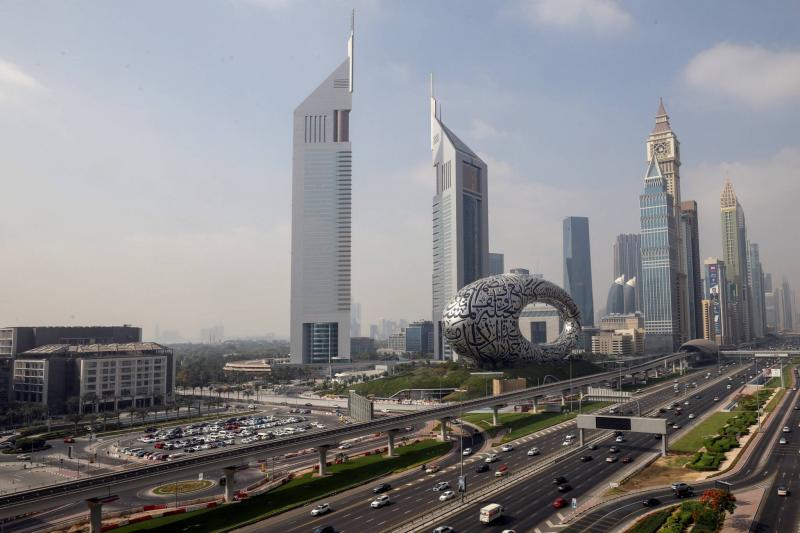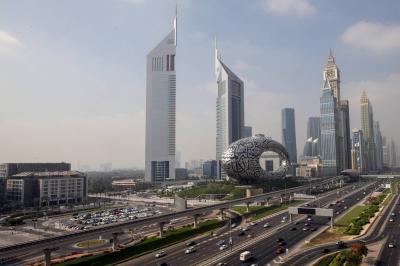Dubai is accelerating efforts to attract residents, investors, and capital to stimulate long-term growth, buoyed by a rapid economic recovery following the COVID-19 pandemic. The emirate is betting that it can avoid previous debt crises that hampered its ambitions on the global stage. The approach being sought is a re-utilization of a shining economic model that has focused for decades on real estate investment, tourism, and foreign capital inflows.
The real estate sector in Dubai has returned to prosperity, aided by strong Russian demand amid the war in Ukraine and more lenient residency rules. Analysts believe that this time there are more protective measures in place to counter any recurrence of problems that impacted Dubai after the 2008 global financial crisis. Dubai, which hosts the world's tallest skyscraper and artificial islands, aims to achieve ambitious new targets, with a ten-year economic plan known as "D33" aiming to double the size of the economy and position Dubai among the world's top four financial centers within a decade. Additionally, Dubai wants to increase the length of its public beaches to 105 kilometers from 21 kilometers by 2040 and revive the Palm Jebel Ali project, which was halted after the 2008 financial crisis. Tourist numbers in 2023 have nearly returned to 2019 levels, and research conducted by Knight Frank found that Dubai ranked fourth worldwide last year among the most expensive real estate markets in terms of demand, with 219 homes sold for over ten million dollars.
However, at the same time, rising property prices and increasing demand for ultra-luxury units are reminiscent of past excessive increases. In 2008, Dubai was significantly impacted by the global financial crisis, leading to capital outflows, resident departures, plummeting property prices, and major companies, famously linked to the government, facing severe difficulties in repaying debts. Eventually, Abu Dhabi, the oil-rich capital of the UAE, intervened and provided Dubai with a lifeline by offering $20 billion, which is expected to be extended for the third time. Nasser Al Sheikh, the former director-general of Dubai's Finance Department, who held the position until 2009, stated, "There is a risk that Dubai may become a very expensive place to live, thus new projects must ensure there is plenty of supply to meet the demand for affordable housing for the middle-class with the increasing population." He added, "If private sector real estate developers cannot provide that, the government and related entities may need to play a larger role in ensuring that prices remain reasonable," referring to major companies that have driven significant growth in Dubai's economy.
Dubai's population surpassed 3.55 million in 2022, according to official statistics, marking a 2.1% increase from 2021 and four percent since 2020. S&P Global Ratings expects the population to exceed four million by 2026. Dubai established a public debt management office in 2022, repaid or restructured some maturing debts, and announced plans to list government stakes in ten companies to raise capital and support financial markets. Dubai has already listed four of these companies last year. The sheikh noted that current financial officials have learned from experiences of 15 years ago. He said, "Dubai has a strategy today, and the development of capital markets is an important component of Dubai's overall financial proposal, not only to provide liquidity and repay debts but also to solidify capital markets in the financial sector."
Dubai, the commercial hub of the UAE, has invested resources into social reforms, business reforms, and sectors such as digital technology. Oil revenues account for less than two percent of GDP, unlike Abu Dhabi with its abundant financial resources. Russian demand for real estate has supported the economy. Real estate research firm CBRE reported that average property prices rose by 12.8% in the first quarter, with villa prices increasing by up to 15%. Villa sales exceeded highs recorded in 2014. According to the list by PropertyFinder, Russian buyers ranked third among the top ten nationalities purchasing property in May, following India and the UK. Richard Wind, the managing director of PropertyFinder in the emirate, stated, "Dubai has truly positioned itself as a global safe haven," adding that it is safe for families and politically and financially stable. He continued, "It is no longer a speculative market. It is a market based on real investment. I think that makes a significant difference from what we saw in 2008 and 2009 and perhaps the last peak around 2014."
The recovery has also boosted the budgets of major Dubai firms, including government-linked entities like Emirates Airline, Emirates NBD Bank, and Emaar Properties, in which the government has a majority stake but are also publicly traded. S&P estimates that Dubai's total government debt will decrease to 51% of GDP, recording $66 billion by the end of 2023, down from 78% of GDP in 2020. However, broader public sector debt will remain high at nearly 100% of GDP due to obligations tied to non-financial government-linked entities. Dubai's five-year credit default swap contracts reached an unprecedented low of 66 basis points on March 8 this year, significantly lower than the peak level of 316 during the height of the COVID-19 pandemic in 2020. Credit default swap contracts are used for insurance against defaulting by a government or company on its debts.
Dubai Seeks to Be Among the Largest Economic Centers Over the Decade A report published by the Financial Times this month on foreign direct investment markets in 2022 found that Dubai attracted an estimated $12.8 billion in foreign direct investment capital, while foreign direct investment in Saudi Arabia totaled around 30 billion riyals (eight billion dollars). Despite increasing competition from neighboring Gulf Arab countries, demand for infrastructure, schools, and hospitals in Dubai remains high. Philip Zuber, CEO of Kerzner International, which manages the luxurious Atlantis and One&Only Resorts, stated, "Dubai is one of the most resilient destinations," noting that the emirate kept its borders open and businesses strong during the pandemic. Kerzner, partially owned by Dubai's sovereign wealth fund, opened the ultra-luxurious Atlantis The Royal resort in 2023, the second Atlantis resort on Palm Jumeirah. A night stay in the Royal Mansion penthouse suite, where pop star Beyoncé once stayed, costs $100,000.




